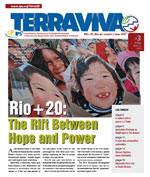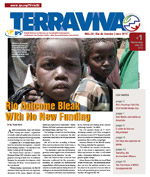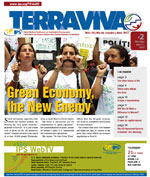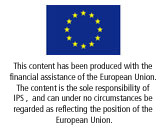by Busani Bafana
RIO DE JANEIRO, Jun 19 2012 (TerraViva) - On a wall in the Rio conference centre is an unusual, brightly coloured tree. It is made of sticky notes, arranged so that the tree’s branches extend down and out. On these notes, delegates passing by the World Association of Girl Guides and Girls Scouts (WAGGGS) have been asked to write down the futures they envision.
Some of the notes mention a green future, sustainable finances, justice, more food and business and civil society partnerships. But for young girls and women, an ideal future contains the opportunity to go to school. It is this message that WAGGGS delegates bring here to the United Nations Conference on Sustainable Development, frequently referred to as Rio+20.
The delegates have been heard, too, at least by some young people who have pasted notes on the wall.

Germaime Umuraza, a delegate for the World Association of Girl Guides and Girl Scouts Association at the Rio+20 conference. She co-founded the project "One Tree Per Child" in Rwanda in 2011. Credit: Busani Bafana
Brendan Schoenman, a student from Colorado in the United States, envisioned a future as a participatory world where every voice is heard. WAGGGS agrees.
“A degraded environment stands in the way of girls getting an education,” Germaime Umuraza, part of the WAGGGS delegation, told TerraViva. “I feel a heavy responsibility to be in Brazil as a voice for millions of girls who could not be here to speak for themselves about the importance of education, because when the environment suffers, girls and young women are affected.”
In her home country of Rwanda, for example, soil erosion affects agriculture and the availability of forest products such as timber and firewood, Umuraza said. A shortage of firewood means that the young women who collect it for cooking are often forced to spend more time searching for firewood and less time on schooling.
In an effort to combat erosion, Umuraza and a group of 50 other young women decided to take action, starting the “One Tree Per Child” project in Kigali in 2011. They bought and distributed seeds to students in primary schools as part of a reforestation project. Just over 1000 trees have been planted. For Umuraka, who is studying to be a civil engineer, this particular initiative is an opportunity to teach young people about conservation.
Grace Olarubofin, another WAGGGS delegate who is from Nigeria and is the state commissioner for the association in Plateau State, has started a project to train young girls in vocational skills such as sewing, farming, animal husbandry and baking. 200 young women who have no formal education have benefited from the program.
But WAGGGS has also embraced the idea of informal education on a larger scale and in a more abstract way. “WAGGGS is promoting informal education,” Umuraka said. “Informal education has been recognised in the text of the Rio negotiations, our voice has been heard and our lobbying has paid off.”
“Rio+20 is an important platform to give a voice to environment issues that affect girls,” said Olarubofin. “Girls are more affected by the environment more than boys. For example, in the Northern State, when a girl is 18, they have to marry and will not go to school. That is why we have decided to teach them self-help skills so that they can look after themselves.”
Founder of the Energia International Network in Zimbabwe, Sheila Oparaocha believes environmental degradation and unsustainable use of environmental resources have a major impact on the lives of women who depend on it for food, water and energy.
“When it comes to managing energy, girls and young women have to look for firewood for cooking,” Oparaocha told TerraViva. “This has a lot of implications for their educational opportunities. If they spend more than five hours collecting firewood, they have little time to go to school.”
“By solving the problems of energy access and energy efficiency we will open up education opportunities for girls and young women.”







 Add to Google
Add to Google







